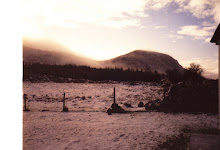
via Ragged Words
Release Date: 17 Aug 2009
Record Label: Drag City
In Three Words: God Isn’t There
Ragged Rating: 4/5
By Daniel Greenwood
The indie- or modern-classical genre is flourishing. It’s been led in recent years by the prolific 12-string guitarist James Blackshaw, classical-drone connoisseurs Stars of the Lid, and the Gnostic frontier-folk of Six Organs of Admittance. Admittedly, James Blackshaw is the most rambunctious of the three, with an overt sensibility for the natural world clear in his song titles such as ‘Skylark Heralds Dawn’ and ‘The Elk with Jade Eyes’. Blackshaw borrows titles from literature for his songs, too, as on his latest The Glass Bead Game, care of Herman Hesse. Stars of the Lid are the seemingly softer touch, but their barely-there style of surface level string instrumentation is devastating in its sparseness, its disappearance and reappearance. Citing David Lynch’s Twin Peaks as inspiration, the Austin, TX pair of Brian McBride and Adam Wiltzie imbue a modern sense of despair that’s either hardly noticeable or completely life-affirming.
There’s a big whiff of philosophical intellectualism about these sorts of artists, and though Six Organs of Admittance fall closest in line with nineteenth-century transcendental American writers such as Ralph Waldo Emerson and Henry David Thoreau, Ben Chasny – the man behind Six Organs – writes lyrics that, at first, completely belie Emerson’s pantheistic (in everyone and everything) kind of God. On ‘Ursa Minor’ Chasny sings: “Good people dying everywhere/ask if God is even there”. But perhaps it’s misguided to dive straight at Chasny’s lyrics, because the real joys of Luminous Night are the instrumental elements. Opener ‘Acteon’s Fall (Against the Hounds)’ has a tune to whistle with pride as you ride on horseback at a canter through the prairie. Panpipes have never sounded so good.
Luminous Night is a dark, brooding work of art. The strength and diversity of the instrumentation – groaning strings, tremulous 12-string picking ala Blackshaw – pretty much oversteps the vernacular of an indie critic. But as a fan it’s great. To recall Emerson, Chasny has little of the positivism you find in the philosopher’s writings, but perhaps it’s simply time and circumstance that divides the two. For where Chasny’s protagonist asks for proof of God (‘Bar-Nasha’), something Kant and Nietszche discouraged over the past few centuries – God cannot be proved nor disproved; God is dead – Chasny’s answer to his own question appears in the storm of distortion that is ‘Cover Your Wounds with the Sky’. And, indeed, the flutter of piano keys that pricks the load are as cold stars in a crumbling winter sky. There are darker undertones still, with ‘Ursula Minor’ alluding to a parent and a child starving in a winter famine. The song ends with a worrisome set of lyrics: “The hospital’s no place to say goodbye/I’m taking you to the shore/at the edge of the shore I kiss your eyes/You know that I’ve never loved anyone more.” Perhaps pantheism exists for Chasny after all.
The work of James Blackshaw, Stars of the Lid and Six Organs of Admittance is providing fans of lo-fi, folk and classical with a generous meeting point. It seems a natural progression for music as art and philosophy. These artists are expressing their concerns and limitations in a style of music that underlines the infinite push of well-made, meaningful instrumental music. In the case of Six Organs of Admittance, Chasny is asking the questions straight out, with panpipes.


No comments:
Post a Comment